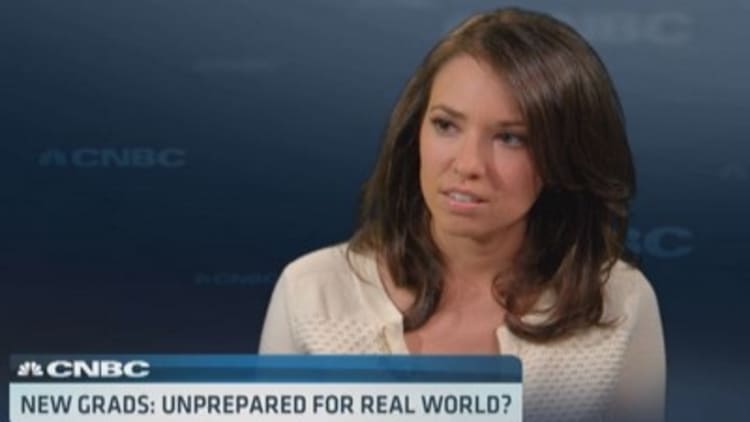
Colleges not preparing students for the workforce has been the perception for a long time—but now there's data to back that up.
A Gallup-Purdue University study describes a huge disconnect between what college presidents think students need to launch successful postgraduate careers and what the schools are actually delivering.
The survey, which involved more than 30,000 students, tackled topics such as internship experience, availability of mentors, enthusiastic teachers, special projects and extracurricular activities.
The biggest sticking point: Internships.
On average, less than a third of undergraduates say they had an internship that reflected their course of study, and there's concern the numbers will go lower.
Read MoreIvy League equals top pay? Think again: Report
"I consider that a monumental failure," said Gallup Education Executive Director Brandon Busteed, who says business leaders have been expressing serious dissatisfaction over how qualified new graduates are for entry-level jobs.
"Part of what we are seeing is that there is still a lot of hubris in higher education," he said. "Most of these college presidents have a lot of confidence that their own institution is just fine. But then we talk about the future of higher education and they are pretty negative."
Gallup broke it down further by major in data provided exclusively to CNBC.com.
Read MoreMIT triumphs in latest world university rankings
The good news: Three-quarters of all business majors said they had a paid job or internship during college.
The bad: Only 23 percent of them believed they were able to apply what they were learning in the classroom.
Read MoreFirst job not going well? Read this
Social science majors were the least likely to say they had a paid job or internship during college.
"I am not that empathetic when I hear a comment like it's too expensive or we couldn't figure out how to scale that. We are spending a lot of money on education in this country, more than any other country," Busteed said.
Tuition and living expenses at many major four-year universities are creeping beyond the $150,000 mark for a degree, and graduates are carrying record amounts of student loan debt.
Money plays a big part when it comes to what colleges will offer students.
"Profit is sometimes a dirty word," said Kalman Chany, president of Campus Consultants and author of "Paying for College Without Going Broke." "They are not making money off of giving students internships. Internship programs do not bring in tuition revenue."
Read MoreWhy America's campuses are going gray
He believes the moment students set foot on campus they need to proactively seek out their own internships. It's in colleges' best interest to fill classes with of a lot of tenured professors, Chany said.
"I wouldn't say they (colleges) are failing their graduates because their mission is to get you a job," he added. "Educators don't necessarily view things that way. Going to college is to prepare you for a job and to educate you on a subject—that's what a lot of colleges believe. It's not a pre–professional program. That's not going to change."
Northeastern University is bucking the trend.
The Boston-based research university, where tuition combined with room and board runs about $56,000 a year, has a special co-op program that provides semester-long full-time internship opportunities for students. The program has been around for more than a century.
Read More
More than 90 percent of the students had internships last year through the co-op, with about a quarter from the business school, according to the university. Many of the participants enroll in internships multiple times over their four years.
"The co-op is part of the learning experience. We integrate the classroom learning experience," Northeastern University President Joseph Aoun said.
More than half of the students get offered full-time jobs by one of their previous co-op employers, according to the Aoun. They range from Wall Street banks to tech companies and start-ups to nonprofit organizations.
"The financial crisis and the recession became a wake-up call not only for families and the students—but for all educators," he said.
—By CNBC's Stephanie Landsman






